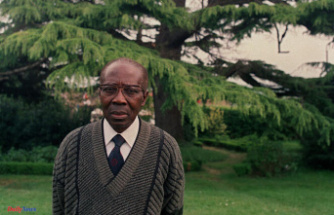"Ai, I still have Jet Lag," he sighs his rainy morning while trajina in his studio. It has been agitated days of travel and presentations: its flamenco exhibition at the Spanish Theater of Madrid and the stop at Paris Photo, where its image of a few nuns tending clothes (which took at 24 years old from the roof of your house) has been chosen as one of the top 20. "Wait, I make up a little," she says before she's the picture of her. «I brought this scarf color fuck, better not, right? And this Chinese shirt that made me a neighborhood dressing by three pesetas ... », Continue before she is the one who gets in front of the camera, although she has always been to the other side.
Colita (or Isabel Steva in his DNI) is the photographer of an Spain even in black and white, a Spain that was struggling between the francoism stenores and a necessary modernity. "The first was me, that is undoubted. Once I left the school, I lived surrounded by photographers. 'If they do it, why do not you? Nor is it so complicated ... '. Then more girls came out, "she says. Many of his photos are already classic: the barracks of gypsies of the somorrostro, the Gran Carmen Amaya ("When Carmen looked at you ... What force, what power!"), The Gauche divine festival, the nights in Bocaccio, the alleys of the Chinatown (Today, a sanitized Raval) and a whole gallery of artists who go from Lola Flores to Orson Welles ... but I had a hanging "a nailed spine," a pending account with the dictatorship that censored it more than one Time, like that ephemeral exposure the gauche qui rit (the left that laughs) that barely lasted two days before the cluster.
"My 81 years ago, the dream book has arrived. Look, I've made books ... but none like this, "admits tail. She talks about antipheminal (co-tied by the Town Hall and Newfoundland), a book-object that she published in 1977 with Maria Aurèlia Capmany, one of the most outstanding intellectuals and feminists of the time. "It was the first book of feminist photography. Then he was not interested in anyone. But now that we are with me too, the 'is not not' and the mother who gave birth to all ... I am my favorite mayor [ADA CUELAU], I show you this feminist book and soon you dance a jot joy », loose.
Antipheminal was an outlawed book. He published him National Editorial because the director was a friend of Capmany but ... when someone of the regime realized what the director had printed was dismissed and the 3,000 specimens of anti-screen ended up in the crusher. "They turned it into Confetti to celebrate the National Festival. The one in this book is a tragic story: they have humiliated it, they have destroyed it, but they have not been able to with it. In the end we have won, although 60 years later, "recognizes Colita. They only survived the scarce copies that had already been sent to the bookstores and that, over the years, they acquired stratospheric prices.
Colita sits at the table with a coffee with milk and a minicroissants. Croissants that this rainy morning works like Proust Magdalena: «Maria Aurèlia and I were neighbors. We were making the purchase in the morning. We were going to the same bakery of a crazy and very high aunt that had 20 cats but she made a great bread ... came from all over Barcelona to buy it. We were in the queue waiting and Maria Aurèlia asked me: 'Do you have many photos of women, Vedad?' » Between the two they composed an allegation about the meaning of being a woman, with texts of Capmany and pictures of Colita. A reverse of the femininity imposed by the scheme: "Behold the ideal of the Spanish woman dictated after the glorious national hoist: house, cooking, sock," Capmany writes, to add with irony that "the Nazis were more liberal". "At that time you had to be an anti-woman. Not being a feminist was throwing stones to your roof as an idiot, "says Colita, which was then the director of photography of the feminist Vindication magazine (" She also made a girl from El Reques and Mop, "she adds).
Those anti-women (or women simply) used often in the dungeon: "I have been in jail with an aunt who stuck there because it was desired to divorce. They got me for driving in a drunken state, eh, you do not believe that by no warfare ... I left the Bocaccio Zurrada lost and I jumped on a traffic light ... Total, I ended up in jail with all prostitutes, that They were lovely and invited me to tobacco. Then there was a woman in a corner, crying desperately: she had put her in prison because he had found her with another. She could not divorce or have a new boyfriend. " The Adultery Law did not abolish until 1978: the sentences could reach up to six years in prison. To legalize abortion, we would have to wait until 1985. "It was all so unjust ... with the death of Franco there was an explosion of joy thinking that the whole mountain is oregano. But no, the corpse was still there, they kept sending the usual ... ».
- How do Feminism see today?
- A monumental mess! Because there are also things that, honestly, I do not understand. I must be very old, that I am ... but all this of the trans and all this story I do not understand ...
- Do you refer to the controversy of the Trans law, the confrontation between Irene Montero and Carmen Calvo?
He opens a lot of his eyes between indignant and scandalized. And that few things can scandalize to Colita ... but see women, feminists, confronted, sulphura.
- I do not understand. If I want to call Pepito, I call myself Pepito and let yourself go from hosts and nonsense! [She raises her arms, very theatrical] If you want to call Juanita ... what do I care about? If you are happy and you are satisfied with your life, then it is already ... come to the group of happy!
- Do you see the feminism divided?
- Before we were all agreed: the woman had to have the same rights as man. We wanted divorce and abortion, very basic things. Today we should do a bit of reflection, sit down and say 'Let's get us out of the most important and then we fight as greengrocer.' But, please, the most important thing let's do it once and forever. For that you have to be all united.
- How has the concept of women evolved? Are we more antifour now?
- It has not evolved so much ... everywhere they cueen beans. Now you will find Anti-Face Disguised from Millennials. But there are still women who are afraid of the male, feminist ideology, freedom. And we are seeing it on television every day, baby: Fulanita have taken away the children, to the other her husband has killed her, to a violated her ... And there are still people who say that feminism has been finish? How do they dare say that? [This phrase she says her with a rage that comes out of the bowels]
- So the phrase of the book is still valid: the woman is a marginalized being whether nun is born as if it is prostitute?
- Yes, true and valid.
Nuns and prostitutes, elderly and gypsy, plump matronies and factor workers, cosified models and handwroughts ... all of them parade by antipheminal in the same plane of equality while the authors are wondering Where have the real women stay in the story of The femininity? And they break the cliché of the aesthetics, advertising, of the intended perfect woman. In the chapter the art of becoming a thing stir against the severe diet, the constant exercise and an eternal youth to get a "beautiful doll that almost floats out of space-time" (words of Capmany). "The ideal woman would have to burn him alive as Juana de Arco. The ideal women have done a lot of damage ... and they continue to do so, "words of tail.
Antipheminal closes with a very habitual scene then. In the El Piropo series, several men address a woman sitting on a terrace. "She was with her cafete and there was a work next to her. Those of her work passed and went with her, a sympathetic way, yes ... but it is the theme of a woman alone: that three men pass by and that they have to get on with her for the saints Shelters of her. It is a touch between critical and friendly to not finish the book as Madame Guillotine doing ZAS! Also at that time we were not as evil as now ». What do you mean by as evil? "Well, now everyone says what comes out of the Potro and stays as wide, hurt or not, be right or not. In the time of antipolism, fortunately, we were more naive, we thought we would change the world or, at least, that we would fix it a bit ».
Today I take self-define as that vineille dame indigne (oldest unworthy lady) who already surrendered tribute in anti-synchmin: a character by Bertold Brecht who, after widening and a whole life dedicated to the family, finally feels free and, in his Old age, he does what he places him, with the consequent horror on the part of his children before that unworthy behavior. And how much dignity was in the unworthy. "Indildo was the National Award that wanted to give me an innoble being that Spanish education was charged [Minister Wert, in 2015]," Colita remembers. "You had to throw a shoe at her head and I had no other than that," she adds. This time I would accept it, right? «Now yes, it's something else! In addition, there is my dear chubby stuffed worship ... [Minister Miquel Iceta]. But I do not want me to give it to me, it would not make sense, "says Colita, the Dame Très Digne.
Date Of Update: 27 November 2021, 02:54











